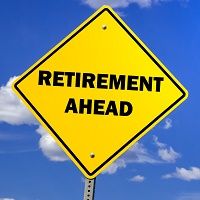Watch for These Pitfalls if You're Thinking of Retiring Early
Early retirement can be a great reward or a great disappointment, depending on the circumstances. Either way, though, you need to ensure you're financially prepared. These three tips offer guidance.

As people live longer, healthier lives, millions are working longer and retiring later. But the same isn’t necessarily true for healthcare practitioners. Physicians have been retiring earlier and earlier, and the same is true for dentists. But the reasons are quite different. Physicians retiring early often cite “lack of autonomy” as one of the reasons driving their decision.
For dentists, many of whom acquire their own practices at some point in their careers, autonomy isn’t the issue. Academic research from Boston College’s Center for Retirement Research suggests that dentists are among the professions that retire earlier because the work requires a level of precision that isn’t as easily achieved at an advanced age.
There are plenty of other reasons for a dentist to consider retiring early, but there are also some common pitfalls to watch out for. These obstacles may not be enough to change your mind, and they shouldn’t necessarily be. But knowing about them now can help you make the right decision for you and prepare better should you hang up the white coat early.
Pitfall 1: Hitting the Road Running
Even for those who choose to retire early, there is a feeling of great anticipation and excitement that comes with having sudden and plentiful free time. If you’ve run a solo practice for many years, you may have been reluctant to take off any extended period of time, in part out of concern for your patients. Some may also think that their earliest years in retirement are going to be their most active, so why wait to enjoy travel and the pursuit of other hobbies until their later years? While there may be some sense in that line of thinking, if you retire early, you’re likely to spend the last third of your life living in retirement.
Avoid the obstacle: Set a retirement budget early on, and adjust it frequently through the first couple years of your retirement. First of all, you’ll need to see how estimates of your spending stack up to the reality. Second, you’ll need to be flexible in terms of how much travel, dining out, and other types of discretionary spending you’ll actually be engaging in. Withdrawing too much too soon can leave you bereft before you know it, and possibly even looking for work again in the near future. Returning to work in dentistry may not be an option as you get older.
Pitfall 2: Results May Vary
This pitfall is more for those contemplating early retirement than those living in retirement. As we’ve covered in several previous columns, if a large part of your nest egg is in the accumulated value of your practice, you should use extra caution in estimating the sale price and end profit of selling. Be on the lookout for factors that could change the sale price of your practice, including the supply of dentists in your area, the success of those practices, local demographic changes such as the departure of a previously big employer or industry in the area, overall property values, local property and business taxes, and many more. Many if not all of these factors are outside of your immediate control, so it is paramount that you have savings and investments beyond your practice.
Avoid the obstacle: Take a good long hard look at your nest egg and your financial plan and make sure both are sound, based in reality, and flexible enough that you could weather some hits to your portfolio, the value of your practice, or other assets. The economy is cyclical, and while those cycles are easy to spot in retrospect, they are notoriously hard to predict in real time. A portfolio that’s flying high this year—and has been for the last five—could take a swift and unexpected dip, even if you are invested in ways that reduce your risk profile as you near retirement. A local real estate environment that’s hot as an oven today could be substantially different only a few short years from now.
Take note: ending up with less than you expected to retire on doesn’t necessarily mean you can’t retire early. It may simply mean adjusting your spending level and retirement lifestyle if everything doesn’t pan out exactly according to plan.
Pitfall 3: Counting on Your Uncle Sam
We discussed in greater detail for our sister site Physician’s Money Digest the difficult decision of when to begin collecting Social Security. If you retire early, you may be tempted to dip into those funds before they run out or before you run out. You can start collecting Social Security benefits as early as age 62, but that doesn’t mean you should. If you start collecting at age 62, you will forego as much as 25% of the monthly amount you will receive by waiting until full retirement age (age 67 for those born after 1960).
Avoid the obstacle: If you’re in position to do so, wait as long as you can to begin taking Social Security benefits. Your benefits will increase each year between the ages of 67 and 70 if you don’t begin to withdraw. (Note: This may change if the political climate around Social Security changes). Unlike unemployment, you can continue to work, or rejoin the workforce, and still receive your benefit, although you need to look into the various income and tax factors you’ll need to know. Consult an advisor or a tax attorney, who can go over your situation and make some recommendations.
ACTIVA BioACTIVE Bulk Flow Marks Pulpdent’s First Major Product Release in 4 Years
December 12th 2024Next-generation bulk-fill dental restorative raises the standard of care for bulk-fill procedures by providing natural remineralization support, while also overcoming current bulk-fill limitations.